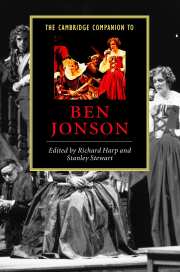Book contents
- Frontmatter
- 1 True relation
- 2 Jonson's London and its theatres
- 3 Jonson and the court
- 4 Ben Jonson and learning
- 5 Jonson's satiric styles
- 6 The major comedies
- 7 Jonson's late plays
- 8 Jonson and Shakespeare and the rhythm of verse
- 9 Jonson's poetry
- 10 Jonson and the arts
- 11 Ben Jonson's Folio of 1616
- 12 Jonson's classicism
- 13 Jonson's criticism
- 14 Jonson's critical heritage
- Bibliography
- Index
14 - Jonson's critical heritage
Published online by Cambridge University Press: 28 May 2006
- Frontmatter
- 1 True relation
- 2 Jonson's London and its theatres
- 3 Jonson and the court
- 4 Ben Jonson and learning
- 5 Jonson's satiric styles
- 6 The major comedies
- 7 Jonson's late plays
- 8 Jonson and Shakespeare and the rhythm of verse
- 9 Jonson's poetry
- 10 Jonson and the arts
- 11 Ben Jonson's Folio of 1616
- 12 Jonson's classicism
- 13 Jonson's criticism
- 14 Jonson's critical heritage
- Bibliography
- Index
Summary
Ben Jonson's reputation stands higher now than at any time since his own era, when it perhaps surpassed Shakespeare's. Today he ranks second in the great age of English drama and is considered one of its very best poets. He continued in high esteem after the 1660 Restoration, but later his fortunes fell as Shakespeare's rose. By the early 1800s his influence languished: his works were sometimes read and respected, occasionally admired, but almost never staged and perhaps as rarely loved. The Romantics seldom valued this professedly classical author, but it was now (ironically) that his fortunes rebounded. He found a devoted editor (William Gifford) whose defenses, though fierce, were usually factual. By now, too, Shakespeare's clear triumph made further battles pointless. Thus began a fairer, more methodical assessment of Jonson. By the mid-twentieth century a renaissance was in full swing, helped by the superb Oxford edition (1925-52). Finally, at century's end, Jonson once again seemed truly central to discussions of his period. Scholarship proliferated; his best plays were regularly (if not widely) performed; and even his “dotages” won some renewed respect. If Jonson were living at this hour, even he might be pleased.
- Type
- Chapter
- Information
- The Cambridge Companion to Ben Jonson , pp. 188 - 201Publisher: Cambridge University PressPrint publication year: 2000
- 1
- Cited by



